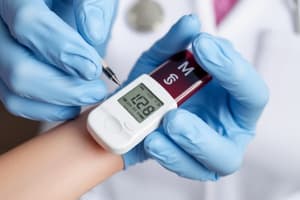Podcast
Questions and Answers
What condition is diagnosed using measurements of blood glucose levels?
What condition is diagnosed using measurements of blood glucose levels?
Diabetes mellitus.
How can blood glucose levels indicate hypoglycemic situations?
How can blood glucose levels indicate hypoglycemic situations?
They show abnormally low glucose levels in the bloodstream.
Why is the time of day significant when measuring blood glucose levels?
Why is the time of day significant when measuring blood glucose levels?
Blood glucose levels can vary based on the time of day due to factors like insulin sensitivity and meal patterns.
What can prolonged hyperglycemia lead to if not diagnosed properly?
What can prolonged hyperglycemia lead to if not diagnosed properly?
What role does glucose measurement play in managing diabetes?
What role does glucose measurement play in managing diabetes?
Why is blood glucose estimation an important test in medical laboratories?
Why is blood glucose estimation an important test in medical laboratories?
What is the relationship between blood glucose tests and diabetes management?
What is the relationship between blood glucose tests and diabetes management?
In what ways can blood glucose estimation impact surgical procedures?
In what ways can blood glucose estimation impact surgical procedures?
What stage of clinical biochemistry commonly involves performing blood glucose tests?
What stage of clinical biochemistry commonly involves performing blood glucose tests?
What are some common conditions for which blood glucose tests are performed?
What are some common conditions for which blood glucose tests are performed?
What fasting blood sugar level indicates hyperglycemia?
What fasting blood sugar level indicates hyperglycemia?
How is hyperglycemia related to diabetes mellitus?
How is hyperglycemia related to diabetes mellitus?
Why is it important to monitor fasting blood sugar levels?
Why is it important to monitor fasting blood sugar levels?
What does a fasting blood sugar level of 6 mmol/L imply?
What does a fasting blood sugar level of 6 mmol/L imply?
Discuss the significance of the 7 mmol/L threshold in diagnosing hyperglycemia.
Discuss the significance of the 7 mmol/L threshold in diagnosing hyperglycemia.
What physiological consequence does the inability of pancreatic islet B-cells to produce insulin have on glucose levels?
What physiological consequence does the inability of pancreatic islet B-cells to produce insulin have on glucose levels?
How does a reduced number of insulin receptors affect glucose metabolism in the body?
How does a reduced number of insulin receptors affect glucose metabolism in the body?
What impact does a defect in glucose absorption have on overall energy levels in the body?
What impact does a defect in glucose absorption have on overall energy levels in the body?
Describe the consequences of the liver's inability to metabolize glycogen on blood glucose levels.
Describe the consequences of the liver's inability to metabolize glycogen on blood glucose levels.
In what way do altered levels of hormones involved in glucose metabolism influence overall metabolic health?
In what way do altered levels of hormones involved in glucose metabolism influence overall metabolic health?
What is the renal threshold for glucose (RTG)?
What is the renal threshold for glucose (RTG)?
How does carbohydrate consumption affect urine glucose levels in a healthy individual?
How does carbohydrate consumption affect urine glucose levels in a healthy individual?
Describe the significance of a nearly glucose-free urine in relation to renal function.
Describe the significance of a nearly glucose-free urine in relation to renal function.
What might be inferred if glucose is present in urine after a carbohydrate meal?
What might be inferred if glucose is present in urine after a carbohydrate meal?
What role does the renal threshold play in preventing glucose from being lost in urine under normal conditions?
What role does the renal threshold play in preventing glucose from being lost in urine under normal conditions?
Flashcards are hidden until you start studying
Study Notes
Blood Glucose Testing
- Blood glucose testing is a common laboratory procedure used for diagnosing and managing diabetes mellitus.
- It's also a common prerequisite for surgeries.
- Blood glucose tests can identify both hyperglycemic (high blood sugar) conditions like diabetes mellitus and hypoglycemic (low blood sugar) situations.
Factors Affecting Blood Glucose Levels
- Time of day: Blood glucose fluctuates throughout the day.
- Pancreatic islet B-cell function: Inability of these cells to produce insulin can lead to hyperglycemia.
- Insulin receptor function: Reduced numbers of insulin receptors can hinder glucose uptake.
- Glucose absorption: Defects in glucose absorption can affect blood sugar levels.
- Liver glycogen metabolism: Impaired liver function in metabolizing glycogen can contribute to hyperglycemia.
- Hormonal imbalances: Altered levels of hormones involved in glucose metabolism can affect blood sugar.
Hyperglycemia
- Hyperglycemia occurs when fasting blood sugar levels exceed 7 mmol/L (or 125 mg/dL), which is typically diagnostic for diabetes mellitus.
- This threshold is known as the renal threshold for glucose (RTG).
- Normal urine is normally free of glucose, even after a carbohydrate-rich meal.
Studying That Suits You
Use AI to generate personalized quizzes and flashcards to suit your learning preferences.




